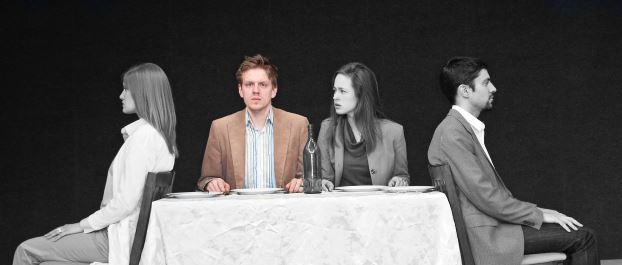
Willoughby CRC Hosts Play for Restorative Justice Week
About 60 people gathered at Willoughby CRC (Langley, B.C.) on Nov 19 to see a dramatic presentation of “Forgiven/Forgotten” that set the tone for Restorative Justice Week. The event was facilitated by Willoughby’s Just-Faith Forum, sponsored by Mennonite Central Committee and Trinity Western University’s school of the Arts, Media and Culture.
After the CRC in Canada (with its various partners) completed a 2-year study on the intersection of justice and faith in the Canadian CRC context, a one act play toured the country and brought the results of the study to life. Churches across Canada, like Willoughby CRC, responded in various ways to the tour. Willoughby formed a JustFaith committee and, this Fall, helped to facilitate the production of the Forgiven/Forgotten play.
In this play, the talented cast of four with the traveling theatre company, Theatre of the Beat, engaged the crowd with a dramatization of what ordinary people experience when someone incarcerated returns “home” from prison. The complete human drama of returning to society is usually unspoken and disregarded in our society, but it gripped us intimately that evening as it became real on the stage.
Through the actors’ dramatization, it became clear that sending someone to prison doesn’t do justice to the needs of the human beings involved; rather, it harms. The script is outlined: “Torn between compassion and their fear of the unknown, a church is thrown into turmoil upon hearing that an offender will be serving his parole in their community.” It is precisely the human dimension of justice that is neglected by the formal criminal justice system. Crime in our society is regarded as a legal offence against the state by having broken its laws; how people, even victims, are harmed, and who should meet their needs is not central to our present justice system. Restorative justice provides a different way.
The ripple effect of an incarceration and the impending parole disturbs the well-being of a human community. The actors poignantly represented a variety of human reactions and unspoken fears. The wife of the prisoner struggles to keep her needs and situation secret as she desires church fellowship. Her desire to hide the fact that her husband is coming home from prison is made complex by her desire for normalcy in her young son’s life. Church members, upon learning that the unknown prisoner husband will be coming to their community, anxiously confront their fears. The pastor wrestles with his theology as the gospel becomes personal. Restorative justice calls for meaningful human response, the affirmation of each person’s worth, and for inclusion.
This play gets beyond the rhetoric of headlines and explicates the community drama behind the scenes of the prison and release experience. It clearly shows the importance of restorative justice. Although it is not necessarily without some pain as personal feelings and biases are faced, it is a ministry that brings reconciliation and needed community support for the prisoner and his/her family.
-written by Henry Smidstra, organizer of the Forgiven/Forgotten play (italicized paragraph added for context)
For more on restorative justice, click here.



